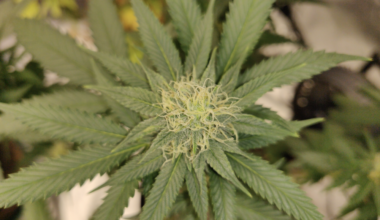Sen. Cory Booker (D-NJ) has recently taken a forceful position against passing a marijuana banking bill in the near future—but it’s not necessarily because he opposes the bipartisan proposal itself, he clarified on Wednesday.
Instead, the senator said that he feels that holding off on voting on the banking reform could encourage his colleagues to support more comprehensive legislation to legalize cannabis and promote social equity, like the draft bill that he, Senate Majority Leader Chuck Schumer (D-NY) and Senate Finance Committee Chairman Ron Wyden (D-OR) recently released.
“First of all, don’t get me wrong, I support the SAFE Banking Act. I think it’s a phenomenal bill,” he said during an interview with Yahoo Finance. “I’m one of these folks that is out here working with cannabis industries—not only across the state of New Jersey, but around the country.”
Watch a partial video of Booker’s quoted remarks below (the full video can be found here):
Cory Booker-
I support #SafeBanking
I work closely with #Cannabis Industry
I want SafeBanking$curlf $gtbif $msos $trssf $crlbf $tcnnf $hrvsf $cchwf $grwg $vrnof $gage pic.twitter.com/wo4S3vb2sT— Jason Spatafora (@WolfOfWeedST) July 21, 2021
“I feel like I am one of their greatest champions when it comes to ending the nightmare of prohibition and the ridiculousness of so many businesses having to operate in cash that increases danger,” he said.
Booker has caught some flak from industry stakeholders since the unveiling of his legalization bill—the Cannabis Administration and Opportunity Act (CAOA)—because he’s repeatedly pushed back against the idea of passing more modest and bipartisan legislation first that would simply protect banks that work with state-legal marijuana businesses.
He took questions on Twitter about the issue on Monday, with several people arguing that his steadfast opposition to advancing the SAFE Banking Act before broad reform is ill-conceived because the former measure stands a much stronger chance of passing this Congress and would represent an incremental yet significant policy change.
This came days after Booker first vowed to “lay myself down” to block any other senators who seek to pass marijuana banking legislation before the body approves comprehensive cannabis reform, igniting the controversy.
But in his latest interview, the senator offered some clarification on his perspective.
“For me, a good bipartisan bill like the banking bill is a necessary sweetener to get people to move along on the equitable justice elements that are really critical,” Booker said, explaining his strategy for threatening to block banking for the time being. “I agree we need to get that banking bill done.”
“I’m hoping that all the industries out there that know that they’re going to make tremendous profits join me in standing up for what I think is the greatest act of patriotism there in saying, ‘I’m not going to put my interest alone. I’m actually going to look out for my fellow American. I’m actually going to pledge to them that I’m going to fight for those people who are in economic devastation because of a nonviolent marijuana charge, that I’m going to make sure that we take care of everybody.’”
“That’s what this country was founded on. Our founders signed the [Declaration of Independence], ending with this ideal of pledging to each other our lives, our fortunes and our sacred honor,” he said. “Well dear god, let’s make that kind of pledge and all go together in reforming our marijuana laws, leaving no one behind.”
To that end, Booker wants to see the Senate move on the CAOA, which would federally deschedule cannabis, expunge prior convictions, allow people to petition for resentencing, maintain the authority of states to set their own marijuana policies and remove collateral consequences like immigration-related penalties for people who’ve been criminalized over the plant.
Schumer, for his part, has also argued that passing a measure that protects banks that service state-legal cannabis businesses first could jeopardize the chances of advancing comprehensive reform.
Under the senators’ legalization proposal, a gradual federal tax rate would be imposed on marijuana sales, starting at 10 percent for the first year after the bill’s enactment and the first, subsequent calendar year. It would then increase annually, rising from 15 percent to 20 percent to 25 percent. Starting in the fifth year post-enactment, the tax would be a “per-ounce or per-milligram of THC amount determined by the Secretary of the Treasury equal to 25 percent of the prevailing price of cannabis sold in the United States in the prior year.”
While that 25 percent tax rate might seem high, the legislation builds in significant federal credits for any company’s sales that are under $20 million a year.
The legislation immediately drew mixed reactions from advocates, other lawmakers and the White House.
Minutes after the senators’ press conference to unveil the bill, White House Press Secretary Jen Psaki was asked at her own daily briefing about the administration’s position on the legislation.
“Nothing has changed,” regarding President Joe Biden’s longstanding opposition to legalizing marijuana, “and there’s no new endorsements of legislation to report today,” she said.
The sponsors have made clear they are open to suggestions for how the draft proposal can be improved, and they are actively inviting public feedback. For example, they’re especially interested in hearing about measuring cannabis potency, coordinating federal and state law enforcement responsibilities and balancing efforts to reduce barriers to entry to the marijuana industry while mitigating the influence of illicit cannabis operators.
Interested parties are encouraged to submit comments on these and other issues to [email protected] by September 1.
The hope is that the public comment period will help build buy-in from stakeholders and lawmakers, getting them closer to the 60-vote threshold they need to pass the legislation in the Senate. By the looks of it, it’s going to be a tough battle that will require significant negotiations to push legalization across the finish line in the chamber.
In recent months, Schumer has been making the case for reform everywhere from a speech on the Senate floor on 4/20 to a cannabis rally in New York City.
The three senators formally started their efforts on the legalization bill by holding a meeting earlier this year with representatives from a variety of advocacy groups to gain feedback on the best approach to the reform.
Schumer made a point in March to say that it will specifically seek to restrict the ability of large alcohol and tobacco companies to overtake the industry. Instead, it will prioritize small businesses, particularly those owned by people from communities most impacted by prohibition, and focus on “justice, justice, justice—as well as freedom,” he said.
He also urged voters to reach out to their congressional representatives and tell them that “this is long overdue.”
Meanwhile, a separate House bill to federally legalize marijuana and promote social equity in the industry was reintroduced in May.
The legislation, sponsored by Judiciary Committee Chairman Jerrold Nadler (D-NY), was filed with a number of changes compared to the version that was approved by the chamber last year.
The Marijuana Opportunity, Reinvestment and Expungement (MORE) Act passed the House but did not advance in the Senate under GOP control. But this time around, advocates are optimistic that the policy change could be enacted now that Democrats run both chambers and the White House, and as more states are moving to enact legalization.
President Joe Biden, however, is an outlier within the Democratic Party, maintaining an opposition to adult-use legalization despite the widespread and increasingly bipartisan public popularity of the reform. It remains to be seen whether the president—who campaigned on more modest pledges to decriminalize cannabis possession, expunge prior records and respect state legalization laws—would stand in the way of a comprehensive policy change by threatening to veto the bill that’s ultimately produced.
Wyden, who under the chamber’s new Democratic majority assumed the top spot on the Senate Finance Committee—where the new legislation is likely to be referred once formally introduced—recently said his goal will be to “end the prohibition and come up with sensible tax and regulatory oversight at the federal level.”
He said in February that “it’s not enough in my view to just end cannabis prohibition,” and “I think we need to restore the lives of people who’ve been hurt most by the failed war on drugs and especially black Americans.”
All three senators—Schumer, Wyden and Booker—have in past years introduced marijuana legalization bills that never got hearings or votes.
Separately, a proposal to federally deschedule marijuana that does not include social equity components was recently filed by a pair of Republican congressmen. Those lawmakers also sent a letter to Biden on Monday, urging him to keep his campaign promise and reschedule marijuana under the Controlled Substances Act (CSA).
Congressional Lawmakers Push For Psychedelics Research For Veterans In New Report
Medical Disclaimer:
The information provided in these blog posts is intended for general informational and educational purposes only. It is not a substitute for professional medical advice, diagnosis, or treatment. Always seek the advice of your physician or other qualified healthcare provider with any questions you may have regarding a medical condition. The use of any information provided in these blog posts is solely at your own risk. The authors and the website do not recommend or endorse any specific products, treatments, or procedures mentioned. Reliance on any information in these blog posts is solely at your own discretion.







